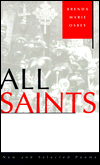Distinguished Visiting Professor
Carter G. Woodson Institute for African American & African
Studies at the University of Virginia
& Emilia Galli Struppa Fellow of Virginia Humanities
Brenda Marie Osbey is an author of poetry and of prose nonfiction in English and French. Her teaching and research focus on narrative language, voice and placement; history of poetry and poetics of the Americas of the precolonial and colonial eras; narrative and material texts of culture; and the place of New Orleans in Atlantic and inter-American spheres.
A 2018 Fellow of the Virginia Foundation for the Humanities, Osbey is conducting research for a new project entitled "Virginia Suite."
Autumn 2018:
Free Your Funky Mind!
Modernist Africana Poetry of the Americas [MAPA]
Meets: Wednesdays 3:30--6:00 p.m., 113 Monroe Hall
Office Hours:
Wednesdays 1:00--2:30
& by appointment
452 New Cabell Hall
& by Appointment.
In the meantime:
Listen to Osbey's Academy of American Poets reading of:
"On Contemplating the Breasts of Pauline Lumumba."
Read the poem and author's commentary.
Read full biography.
 All Souls: Essential Poems by Brenda Marie Osbey |
|---|
 History & Other Poems by Brenda Marie Osbey, 2013 |
 All Saints: New & Selected Poems by Brenda Marie Osbey |
 Desperate Circumstance, Dangerous Woman by Brenda Marie Osbey |
 In These Houses by Brenda Marie Osbey |
 Ceremony for Minneconjoux by Brenda Marie Osbey |
 Gabriel Okara: Collected Poems, Edited & w/Introduction by Brenda Marie Osbey |

".... Antar ibn Shaddad, the Black Raven of Saudi Arabia, wrote that three things define man: “to make love, to make war, to make verse.” Long before his 6th century epic of war and love, the Gabon Death Rite Suites and hunting poems were composed, and the Khoikhoi lyric poems on the nature of the universe, all of which tell such a great deal about ancient sub-Saharan African social and political life, religion, mythology and warfare. The teachings of Lao-Tsu come to us in verse. Much of the accepted history of Western antiquity comes to us from Homer. And, of course, the Nahuatl philosopher-poet-king and master craftsman Nezahualcoyotl recorded in poems and songs much of what we've come to understand about life in the pre-Columbian Americas. Indeed, much if not most of what we know (or claim to know) about the ancient worlds of Africa, Asia, the Americas and Europe, we know through poetry anyway. What ancient societies can we claim to know that didn't have generations of peripatetic bards carrying news and history in some combination of song, lyric and narrative poem? More recently, so much of what we've come to understand about the experience of the Middle Passage we know from Robert Hayden's brilliant narrative poem of that title. In the words of the late Audre Lorde, poetry is not a luxury. Literary critic Deborah McDowell writes passionately about “the myths, the fables, the abridgements, the approximations, and the outright lies that masquerade” in the name of history. This presumed divide between history and poetry really is a relatively recent one, and one that seems to underscore the recent need to segregate intellectual and creative work into neat and exclusive categories. Hence, the notion of history as the serious business of historians and, more and more, of journalists, and of poetry as an art form concerned primarily with personal identity and craft, precious, interesting perhaps, but signifying nothing. My own practice has always been to think of poetry first, foremost and always as a way of engaging and interacting in and with the world."
-- Osbey. "The Poem as History,"War|Scapes 15 October 2013.
Visit the site.
